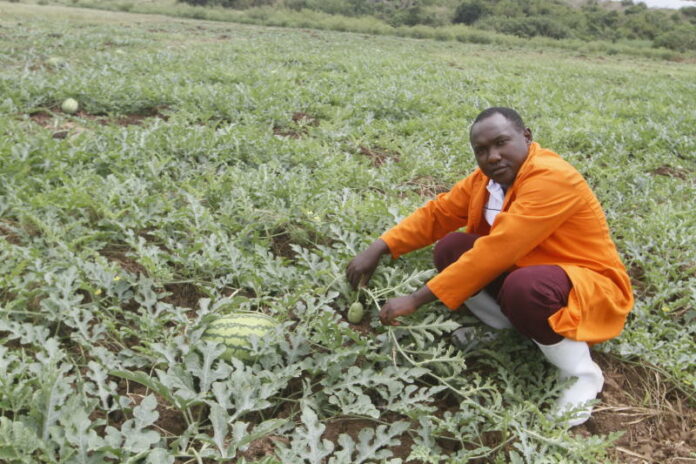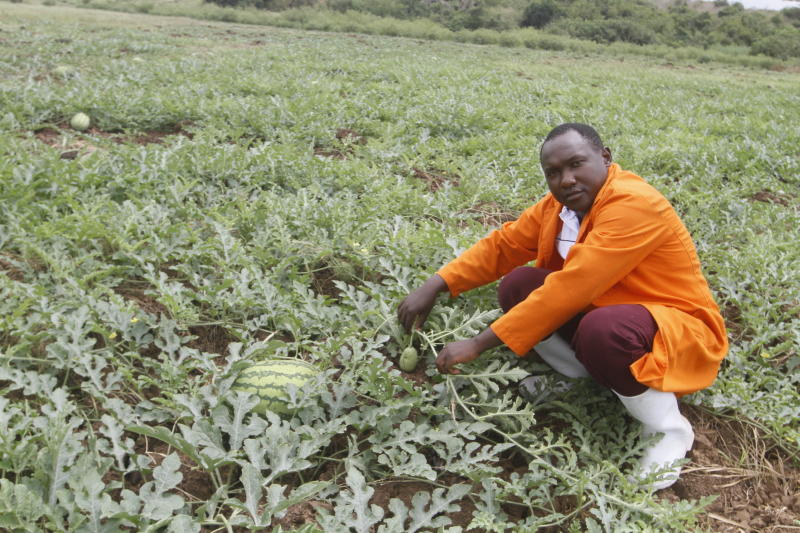Watermelon business in Kenya: This feature on the challenges of farming watermelons was first published in the Smart Harvest journal: Six years ago, Mr Zacharia Onchuri packed his bags and left his home in Sotik to pursue a new life. He was 22, desperately seeking for a start over, after he was forced to drop out of college where he was studying journalism due to lack of school fees.
He arrived in Kilifi to put up with his friend. Together, they started vending sugar cane and water melons in buckets around neighbouring markets. Onchuri did the job earnestly for six months, before a new idea hit him.
“I realised people were eating a lot of watermelons, especially during the hot seasons. We would run out of stock before evening,” he says.
Shocking details of Dusit terrorist Violet Kemunto alias ‘Al Shabaab Bride’
He decided to start growing his own melons. With Sh. 20,000 that he had saved from his sales, he asked one of the farmers in Kilifi’s Chakama location to give him quarter an acre of land for lease. It did not matter to him that the parcel of land was situated more than 70 kilometres from the main road.
After sourcing for seedlings from farmers in the town, he planted and started waiting with enthusiasm. He was ready for his first boom but harvested disappointment.
“All my crops died. I was a newbie and I did not know what to spray when disease struck,” he says.
He went back to vending for a few months while contemplating on the possibility of returning to farming.
His love for farming won. He decided to give it another try barely two months after his first loss. Before diving back, he booked for consultation with Mr Simeon Bosire, one of the successful water melon farmers in Coast.
“Watermelon needs a lot of attention. The soil should be warm enough during plantation, and you must constantly water the seedlings to get good yields. You should also spray against diseases and not wait until the crop is affected,” says Bosire.
Abdi Ali, an agronomist in Kilifi says water melons tend to do well in hot temperatures such as Coast, Eastern and North Eastern, but they also need constant water supply for them to produce sturdy and sweet fruits.
“It is advisable for a farmer to have their soil tested and once they start growing, they should be checked for vine borers which are the worst enemies of water melons,” he says.
For the next one year, Onchuri describes his journey as a watermelon farmer as that of trial and error. He went online, joined social media groups where young farmers like himself were looking for solutions on what it takes to grow the healthiest melons.
His first bumper harvest gave him five tonnes. He was excited but his joy momentarily came to a halt when he realised it would cost him a lot to transport the melons to the market. He was also confronted with the reality that he would need to market his fruits fast before they start rotting.
“Social media saved me. I started using my Facebook page to tell people about my melons, and before long, people were sending me messages, asking if they can come to my farm to pick,” he says.
Over the years, his fame grew both online and in the markets where he supplied his fruits. In three years, he had expanded and bought 12 acres of land. “I would look for owners with idle land and negotiate for a low fee, because most people here believe crops cannot flourish in Kilifi,” he says.
He also bought 17 more acres in Garsen, Tana River County after he visited and met farmers who have gotten into large scale farming.
His other loss came early this year when floods hit the Coast, submerging all his crops.
Onchuri says his heart sunk when he visited his farm and found that the entire field had been swept off a few weeks before harvest.
It is when the rains had subsided that he came face to face with the loss the rains had caused.
“All the pipes and machines I had bought for irrigation were broken. I had lost all crops, and yet I had loans and bills to pay,” he says.
He let go of the six farm boys he had employed. He says the worst feeling was the look of despair on their faces as he broke news that he would no longer need them.
“I almost went into depression. I had put a lot in farming, and it was letting me down,” he says. He chuckles when he talks about why he gave it another shot.
“I realised that the gains outweigh the losses. In seasons where I get a good harvest, I can make more than Sh. 500,000, which is not easy to come by in other professions,” he says.
He is slowly working towards rebuilding what he lost. He expects another harvest in October, and has already started establishing contacts with potential buyers with hopes of selling more.
“I do not want to have any wastage. My farm is far from the road, so I have to get my buyers early so that we work on transport logistics,” he says. His other challenge has been getting agronomists who can help with crop spraying and advising on the best manure to use.
“There are very few extension officers and they work mostly in town. I had to learn how to do everything myself, and there are days when I wondered if I was doing the right thing,” he says.
He is especially worried about the yellow mosaic virus, a crop disease that he says spreads fast and is very difficult to treat. His future plan is to spread his business beyond Kilifi. He has already set up a website called “Watermelon masters” where he hopes to meet more customers, and educate people who are interested in farming watermelons in large scale.
His social media pages are also coloured with his farming activities, and he says there isn’t a day when someone does not contact him asking him to supply.










Finally a real story about farming!